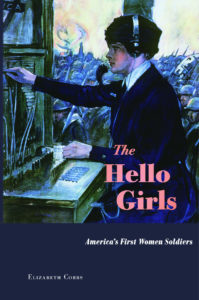Lecture Date: February 6, 2018
The Hirschler Fleischer Lecture

In 1918, the U.S. Army Signal Corps sent 223 young women to France. They were masters of the latest technology: the telephone switchboard. General John Pershing demanded female “wire experts” when he discovered that inexperienced doughboys were unable to keep him connected with troops under fire. Without communications for even an hour, the army would collapse.
While suffragettes picketed the White House and President Woodrow Wilson struggled to persuade a segregationist Congress to give women of all races the vote, these courageous soldiers swore the Army oath. Elizabeth Cobbs reveals the challenges they faced in a war zone where men welcomed, resented, wooed, mocked, saluted, and ultimately celebrated them. They received a baptism by fire when German troops pounded Paris with heavy artillery. Some followed “Black Jack” Pershing to battlefields where they served through shelling and bombardment. Grace Banker, their 25-year-old leader, won the Distinguished Service Medal.
The army discharged the last “Hello Girls” in 1920. When the last operators sailed home, the army unexpectedly dismissed them without veterans’ benefits, beginning a sixty-year battle. With the help of the National Organization for Women and Senator Barry Goldwater, America’s first women soldiers finally triumphed over the US Army in 1979.
Speaker: Elizabeth Cobbs

Elizabeth Cobbs is the author of seven books, most recently The Hello Girls: America’s First Women Soldiers and The Hamilton Affair, A Novel. She is the winner of four literary prizes, and has written for the New York Times, Jerusalem Post, Los Angeles Times, and Reuters. Her first documentary film, American Umpire, debuted on public television in 2017 under the narration of Jim Lehrer. Cobbs has served on the Historical Advisory Committee of the U.S. State Department and the jury for the Pulitzer Prize. She holds the Melbern Glasscock Chair in American History at Texas A&M and is a Senior Fellow at Stanford’s Hoover Institution.